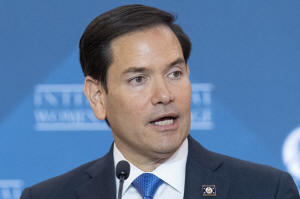A wary Europe awaits Rubio with NATO's future on the line
[April 02, 2025]
By MATTHEW LEE and LORNE COOK
WASHINGTON (AP) — U.S. Secretary of State Marco Rubio travels this week
to a gathering of top diplomats from NATO countries and is sure to find
allies that are alarmed, angered and confused by the Trump
administration’s desire to reestablish ties with Russia and its
escalating rhetorical attacks on longtime transatlantic partners.
Allies are deeply concerned by President Donald Trump’s readiness to
draw closer to Russian leader Vladimir Putin, who sees NATO as a threat,
amid a U.S. effort to broker a ceasefire in Ukraine. Recent White House
comments and insults directed at NATO allies Canada and Denmark — as
well as the military alliance itself — have only increased the angst,
especially as new U.S. tariffs are taking effect against friends and
foes alike.
Rubio arrives in Brussels on Thursday for two days of meetings with his
NATO counterparts and European officials, and he can expect to be
confronted with questions about the future U.S. role in the alliance.
For 75 years, NATO has been anchored on American leadership, and based
on what they have seen and heard since Trump took office in January,
European officials have expressed deep concerns that Trump may upend all
of that when he and other NATO leaders meet for a June summit in the
Netherlands.
Can Rubio reassure allies?
As Rubio did last month at a meeting of foreign ministers from the Group
of 7 industrialized democracies, America's top diplomat, who is regarded
by many overseas as a more pragmatic and less dogmatic member of Trump's
administration, may be able to salvage a watered-down group consensus on
the war in Ukraine.

That's even as Trump said this week that Ukraine “was never going to be
a member of NATO” despite leaders declaring at last year's summit that
the country was on an “irreversible” path to join.
But Rubio will be hard-pressed to explain Washington’s unprovoked verbal
attacks on NATO allies Canada, which Trump says he wants to claim as a
51st state, and Denmark, whose territory of Greenland he says the U.S.
should annex. Both have been accused of being “bad allies” by Trump and
Vice President JD Vance.
“It’s pretty clear neither territory has any interest in joining a
Trumpian America,” said Ian Kelly, U.S. ambassador to Georgia during the
Obama and first Trump administration and now an international studies
professor at Northwestern University in Evanston, Illinois.
“There’s going to be a lot of very anxious Euros about what Trump is
going to call for and what announcements he’s going to make,” he said.
“If he isn't already, Rubio is going to be in a mode of trying to
reassure European allies that we are not, in fact, not dependable.”
Yet, in just under two months, NATO has been shaken to its core,
challenged increasingly by Russia and the biggest land war in Europe
since 1945 from the outside, and by the Trump administration from
within, breaking with decades of relatively predictable U.S. leadership.
Trump has consistently complained about NATO members' defense spending
and even raised doubts about the U.S. commitment to mutual defense in
the alliance's founding treaty, which says an attack on one NATO member
is considered an attack on all.

[to top of second column]
|

Secretary of State Marco Rubio, speaks during the International
Women of Courage award ceremony, Tuesday April 1, 2025, at the State
Department in Washington. (AP Photo/Jacquelyn Martin)

Europeans taking on more security guarantees
Since Defense Secretary Pete Hegseth warned last month that U.S.
security priorities lie elsewhere — in Asia and on its own borders —
the Europeans have waited to learn how big a military drawdown in
Europe could be and how fast it may happen.
In Europe and Canada, governments are working on “burden shifting”
plans to take over more of the load, while trying to ensure that no
security vacuum is created if U.S. troops and equipment are
withdrawn from the continent.
These allies are keen to hear from Rubio what the Trump
administration’s intentions are and hope to secure some kind of
roadmap that lays out what will happen next and when, so they can
synchronize planning and use European forces to plug any gaps.
At the same time, NATO’s deterrent effect against an adversary like
Russia is only credible when backed by U.S. firepower. For the
Europeans and Canada, this means that U.S. nuclear weapons and the
6th Fleet must remain stationed in Europe.
“America is indispensable for credible deterrence," a senior NATO
diplomat told reporters on condition of anonymity to speak ahead of
the meeting.
Around 100,000 U.S. troops are deployed across the continent.
European allies believe at least 20,000 personnel sent by the Biden
administration after Russia launched its full-scale invasion of
Ukraine three years ago could be withdrawn.
Another priority for U.S. allies is to understand whether Trump
believes that Russia still poses the greatest security threat. In
their summit statement last year, NATO leaders insisted that “Russia
remains the most significant and direct threat to Allies’ security.”

But Trump’s receptiveness to Putin and recent favorable remarks by
some U.S. officials have raised doubts. The question, diplomats say,
is why allies should spend 5% of their gross domestic product on
their defense budgets if Russia is no longer a threat.
At the same time, the Europeans and Canada know they must spend more
— not least to protect themselves and keep arming Ukraine. At their
next summit in June, NATO leaders are expected to raise the
alliance’s military budget goal from at least 2% to more than 3%.
Rubio “is in a very difficult position,” said Jeff Rathke, president
of the American-German Institute at Johns Hopkins University. Trump
“has tried to convince allies that a U.S. realignment with Russia is
in the best interests of the U.S. and presumably Europe, and at the
same time tell them that they need to double their defense spending
to deal with threats posed by Russia," he said. "The logical
question they will ask is ‘why?'”
___
Cook reported from Brussels.
All contents © copyright 2025 Associated Press. All rights reserved |